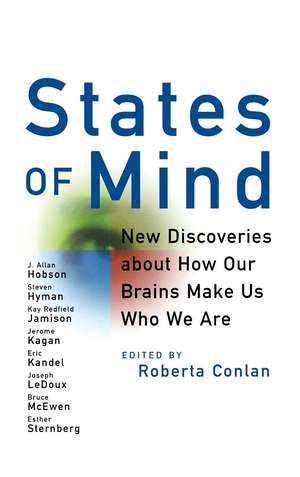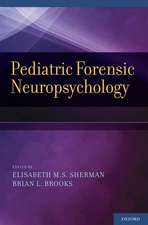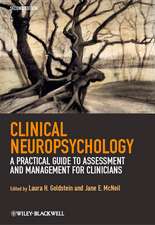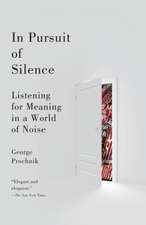States of Mind: New Discoveries about How Our Brains Make Us Who We Are
Autor Roberta Conlon, J. Alllenna Hobson, K. Conlanen Limba Engleză Hardback – 15 mar 1999
Are we born to be shy? Why do we remember some events so clearly and others not at all? Are creativity and depression somehow linked? Do our dreams really have deeper meanings?
Now in paperback, here is a wonderfully accessible introduction to the most important recent findings about how our health, behavior, feelings, and identities are influenced by what goes on inside our brains. In this timely book, eight pioneering researchers offer lively and stimulating discussions on the most exciting discoveries as well as a new way of understanding our emotions, moods, memories, and dreams. Inside, you′ll find:
∗ J. ALLAN HOBSON, author of the groundbreaking The Dreaming Brain, leading a tour of dream states and explaining why we dream and what dream studies reveal about our minds
∗ ERIC KANDEL, winner of the 2000 Nobel Prize in Medicine, taking us along the chain of biological events that create long–term memories, revealing how we stand at the brink of helping those who suffer from grave mental and memory disorders
∗ STEVEN HYMAN, director of the National Institute of Mental Health, tracing the links between nature and nurture, particularly in addiction and mental illness, to explain the relationship between inherited tendencies and the impact of life experience
∗ KAY REDFIELD JAMISON, bestselling author of An Unquiet Mind, explaining manic depression, its prevalence among gifted artists, writers, and musicians, and the societal questions raised by trying to eradicate the "depression gene"
. . . and much, much more. Whether discussing the brain–body connection, the sources of emotion, or the ethereal world of dreams, States of Mind enables you to share in the very latest explorations into the nature and function of the human mind.
Preț: 158.58 lei
Nou
Puncte Express: 238
Preț estimativ în valută:
30.34€ • 31.77$ • 25.11£
30.34€ • 31.77$ • 25.11£
Carte disponibilă
Livrare economică 17-31 martie
Preluare comenzi: 021 569.72.76
Specificații
ISBN-13: 9780471299639
ISBN-10: 0471299634
Pagini: 224
Dimensiuni: 148 x 224 x 22 mm
Greutate: 0.36 kg
Editura: Wiley
Locul publicării:Hoboken, United States
ISBN-10: 0471299634
Pagini: 224
Dimensiuni: 148 x 224 x 22 mm
Greutate: 0.36 kg
Editura: Wiley
Locul publicării:Hoboken, United States
Public țintă
General Readers of Trade Science, Readers of General Psychology books.Descriere
"Most neuroscientists now argue that the biological organ inside our skulls is both the source and repository of our elusive identity, and of all aspects of cognition and emotion. The balance of chemicals in our individual brains may predispose us to react to life′s ups and downs with a characteristic tranquility or agitation. Disturbances of that chemical balance can trigger mood disorders and mental illness. And burgeoning research into the connection between the brain and the body is reinforcing the idea that the influence flows in both directions that is, our attitudes and emotions, once regarded as purely a function of ′mind,′ can affect the health of the body, and vice versa. . . . As all of this research reaffirms, the fundamental characteristic of human consciousness and identity is that they are shaped and reshaped by a brain that is continually adapting to the world around us. Whether we′re reading or walking, dreaming or talking, the particular impulses and pathways of the brain′s billions of neurons are storing experience, learning and unlearning, and creating us anew in the process." from the Introduction. States of Mind is a wonderfully accessible introduction to the most important recent findings about how our health, behavior, feelings, and identities are influenced by the workings of our brains. Eight pioneering researchers present remarkable new insights about how our inner lives both of the mind and of the body are generated and regulated by the marvelous biology going on inside our heads.
These preeminent scientists offer a new way of understanding ourselves of peering into the workings of our brains in order to appreciate how our emotions and moods, our memories and dreams come about. They also reveal a new understanding of health and illness and how important the interconnections between our minds and bodies are. Are we born to be shy? Why do we remember some events so clearly and others not at all? Do our dreams really have deeper meanings? Are creativity and depression somehow linked? How does stress affect our vulnerability to illness? Whether discussing the brain–body connection, the sources of emotion, or the ethereal world of dreams, these top experts offer lively and stimulating introductions to the most exciting findings, and a new way of understanding our lives.
An all–star lineup of scientists takes you to the front lines of brain research.
J. ALLAN HOBSON, author of the groundbreaking The Dreaming Brain, leads us on a tour of dream states, the reasons we dream, and what dream studies reveal about our minds.
These preeminent scientists offer a new way of understanding ourselves of peering into the workings of our brains in order to appreciate how our emotions and moods, our memories and dreams come about. They also reveal a new understanding of health and illness and how important the interconnections between our minds and bodies are. Are we born to be shy? Why do we remember some events so clearly and others not at all? Do our dreams really have deeper meanings? Are creativity and depression somehow linked? How does stress affect our vulnerability to illness? Whether discussing the brain–body connection, the sources of emotion, or the ethereal world of dreams, these top experts offer lively and stimulating introductions to the most exciting findings, and a new way of understanding our lives.
An all–star lineup of scientists takes you to the front lines of brain research.
J. ALLAN HOBSON, author of the groundbreaking The Dreaming Brain, leads us on a tour of dream states, the reasons we dream, and what dream studies reveal about our minds.
- STEVEN HYMAN, director of the National Institute of Mental Health, traces the links between nature and nurture, particularly in addiction and mental illness, to explain the relationship between inherited tendencies and the impact of life experience.
- KAY REDFIELD JAMISON, bestselling author of An Unquiet Mind, explains manic depression, its prevalence among gifted artists, writers, and musicians, and the societal questions raised by trying to eradicate the "depression gene."
- JEROME KAGAN, director of Harvard′s Mind–Brain–Behavior Initiative, presents the latest findings on how a child′s environment and inborn biology combine to shape and reshape personality and temperament.
- ERIC KANDEL, director of Columbia′s Center for Neurobiology and Behavior, takes us along the chain of biological events that create long–term memories, revealing how we stand at the brink of helping those who suffer from grave mental and memory disorders.
- JOSEPH LEDOUX, author of the acclaimed The Emotional Brain, guides us through the pathways of emotion and describes his pioneering work in the biology of the emotion of fear.
- BRUCE MCEWEN, director of the Laboratory of Neuroendocrinology at Rockefeller University, reports on the growing problem of stress and reveals the damage it can inflict on both biological health and cognitive abilities, such as memory.
- ESTHER STERNBERG, chief of the section on neuroendocrine immunology and behavior at the National Institute of Mental Health, shares her findings in the study of the brain and disease, demonstrating the substances at work in the nervous and immune systems and the reaction of these systems to strong emotions. States of Mind enables you to share in the thrill and wonder of the very latest explorations into the nature and function of the human mind.
ROBERTA CONLAN is a regular contributor to the publications of the National Academy of Sciences.
Textul de pe ultima copertă
"Most neuroscientists now argue that the biological organ inside our skulls is both the source and repository of our elusive identity, and of all aspects of cognition and emotion. The balance of chemicals in our individual brains may predispose us to react to life′s ups and downs with a characteristic tranquility or agitation. Disturbances of that chemical balance can trigger mood disorders and mental illness. And burgeoning research into the connection between the brain and the body is reinforcing the idea that the influence flows in both directions that is, our attitudes and emotions, once regarded as purely a function of ′mind,′ can affect the health of the body, and vice versa. . . . As all of this research reaffirms, the fundamental characteristic of human consciousness and identity is that they are shaped and reshaped by a brain that is continually adapting to the world around us. Whether we′re reading or walking, dreaming or talking, the particular impulses and pathways of the brain′s billions of neurons are storing experience, learning and unlearning, and creating us anew in the process." from the Introduction. States of Mind is a wonderfully accessible introduction to the most important recent findings about how our health, behavior, feelings, and identities are influenced by the workings of our brains. Eight pioneering researchers present remarkable new insights about how our inner lives both of the mind and of the body are generated and regulated by the marvelous biology going on inside our heads.
These preeminent scientists offer a new way of understanding ourselves of peering into the workings of our brains in order to appreciate how our emotions and moods, our memories and dreams come about. They also reveal a new understanding of health and illness and how important the interconnections between our minds and bodies are. Are we born to be shy? Why do we remember some events so clearly and others not at all? Do our dreams really have deeper meanings? Are creativity and depression somehow linked? How does stress affect our vulnerability to illness? Whether discussing the brain–body connection, the sources of emotion, or the ethereal world of dreams, these top experts offer lively and stimulating introductions to the most exciting findings, and a new way of understanding our lives.
An all–star lineup of scientists takes you to the front lines of brain research.
J. ALLAN HOBSON, author of the groundbreaking The Dreaming Brain, leads us on a tour of dream states, the reasons we dream, and what dream studies reveal about our minds.
These preeminent scientists offer a new way of understanding ourselves of peering into the workings of our brains in order to appreciate how our emotions and moods, our memories and dreams come about. They also reveal a new understanding of health and illness and how important the interconnections between our minds and bodies are. Are we born to be shy? Why do we remember some events so clearly and others not at all? Do our dreams really have deeper meanings? Are creativity and depression somehow linked? How does stress affect our vulnerability to illness? Whether discussing the brain–body connection, the sources of emotion, or the ethereal world of dreams, these top experts offer lively and stimulating introductions to the most exciting findings, and a new way of understanding our lives.
An all–star lineup of scientists takes you to the front lines of brain research.
J. ALLAN HOBSON, author of the groundbreaking The Dreaming Brain, leads us on a tour of dream states, the reasons we dream, and what dream studies reveal about our minds.
- STEVEN HYMAN, director of the National Institute of Mental Health, traces the links between nature and nurture, particularly in addiction and mental illness, to explain the relationship between inherited tendencies and the impact of life experience.
- KAY REDFIELD JAMISON, bestselling author of An Unquiet Mind, explains manic depression, its prevalence among gifted artists, writers, and musicians, and the societal questions raised by trying to eradicate the "depression gene."
- JEROME KAGAN, director of Harvard′s Mind–Brain–Behavior Initiative, presents the latest findings on how a child′s environment and inborn biology combine to shape and reshape personality and temperament.
- ERIC KANDEL, director of Columbia′s Center for Neurobiology and Behavior, takes us along the chain of biological events that create long–term memories, revealing how we stand at the brink of helping those who suffer from grave mental and memory disorders.
- JOSEPH LEDOUX, author of the acclaimed The Emotional Brain, guides us through the pathways of emotion and describes his pioneering work in the biology of the emotion of fear.
- BRUCE MCEWEN, director of the Laboratory of Neuroendocrinology at Rockefeller University, reports on the growing problem of stress and reveals the damage it can inflict on both biological health and cognitive abilities, such as memory.
- ESTHER STERNBERG, chief of the section on neuroendocrine immunology and behavior at the National Institute of Mental Health, shares her findings in the study of the brain and disease, demonstrating the substances at work in the nervous and immune systems and the reaction of these systems to strong emotions. States of Mind enables you to share in the thrill and wonder of the very latest explorations into the nature and function of the human mind.
ROBERTA CONLAN is a regular contributor to the publications of the National Academy of Sciences.
Cuprins
Susceptibility and "Second Hits" (S. Hyman).
Born to Be Shy? (J. Kagan).
A Magical Orange Grove in a Nightmare: Creativity and Mood Disorders (K. Jamison).
Stress and the Brain (B. McEwen).
Emotions and Disease: A Balance of Molecules (E. Sternberg).
The Power of Emotions (J. LeDoux).
Of Learning, Memory, and Genetic Switches (E. Kandel).
Order from Chaos (J. Hobson).
Notes.
Index.
Born to Be Shy? (J. Kagan).
A Magical Orange Grove in a Nightmare: Creativity and Mood Disorders (K. Jamison).
Stress and the Brain (B. McEwen).
Emotions and Disease: A Balance of Molecules (E. Sternberg).
The Power of Emotions (J. LeDoux).
Of Learning, Memory, and Genetic Switches (E. Kandel).
Order from Chaos (J. Hobson).
Notes.
Index.
Notă biografică
J. ALLAN HOBSON, author of the groundbreaking The Dreaming Brain, leads us on a tour of dream states, the reasons we dream, and what dream studies reveal about our minds. STEVEN HYMAN, director of the National Institute of Mental Health, traces the links between nature and nurture, particularly in addiction and mental illness, to explain the relationship between inherited tendencies and the impact of life experience. KAY REDFIELD JAMISON, bestselling author of An Unquiet Mind, explains manic depression, its prevalence among gifted artists, writers, and musicians, and the societal questions raised by trying to eradicate the "depression gene." JEROME KAGAN, director of Harvard′s Mind–Brain–Behavior Initiative, presents the latest findings on how a child′s environment and inborn biology combine to shape and reshape personality and temperament. ERIC KANDEL, director of Columbia′s Center for Neurobiology and Behavior, takes us along the chain of biological events that create long–term memories, revealing how we stand at the brink of helping those who suffer from grave mental and memory disorders. JOSEPH LEDOUX, author of the acclaimed The Emotional Brain, guides us through the pathways of emotion and describes his pioneering work in the biology of the emotion of fear. BRUCE MCEWEN, director of the Laboratory of Neuroendocrinology at Rockefeller University, reports on the growing problem of stress and reveals the damage it can inflict on both biological health and cognitive abilities, such as memory. ESTHER STERNBERG, chief of the section on neuroendocrine immunology and behavior at the National Institute of Mental Health, shares her findings in the study of the brain and disease, demonstrating the substances at work in the nervous and immune systems and the reaction of these systems to strong emotions. States of Mind enables you to share in the thrill and wonder of the very latest explorations into the nature and function of the human mind. ROBERTA CONLAN is a regular contributor to the publications of the National Academy of Sciences.










